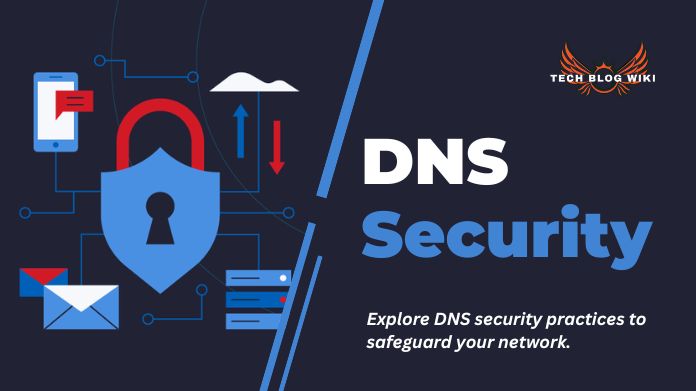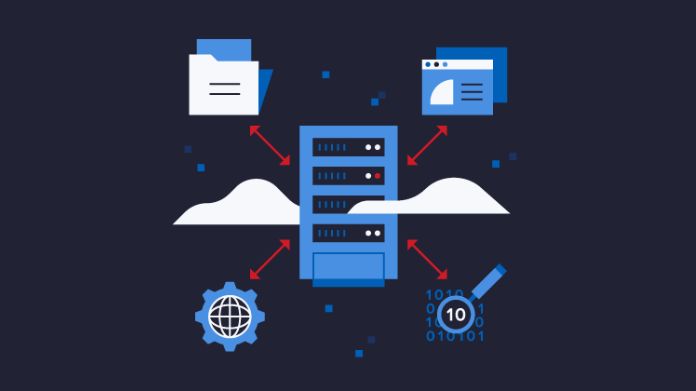In today’s digital landscape, where cyber threats loom large, ensuring the security of your online activities is paramount. One critical aspect of cybersecurity is DNS security, crucial in protecting your network infrastructure from various threats.
DNS, or Domain Name System, serves as the internet’s address book, translating human-readable domain names into IP addresses that computers can comprehend. However, it’s also susceptible to various vulnerabilities that malicious actors can exploit for nefarious purposes.
Understanding DNS security and implementing best practices is essential for safeguarding your network against DNS-related attacks, such as DNS hijacking, cache poisoning, and DNS amplification attacks.
Organizations can mitigate the risks associated with these dangers by adopting robust DNS security measures and ensuring their DNS infrastructure’s integrity, availability, and confidentiality.
In this Techblogwiki article, we’ll delve into the fundamentals of DNS security, explore common DNS security threats, and discuss the best practices that individuals and organizations can employ to enhance their DNS security posture.
Whether you’re a cybersecurity professional looking to bolster your defenses or an internet user concerned about protecting your online activities, understanding DNS security is crucial in today’s interconnected world.
What is DNS Security?

DNS security, or Domain Name System security, refers to the measures and practices implemented to protect the Domain Name System (DNS) from various cyber threats and vulnerabilities.
The DNS is an essential component of the internet infrastructure, responsible for translating human-readable domain names into numerical IP addresses that computers utilize to locate resources on the internet.
DNS security aims to ensure the integrity, availability, and confidentiality of the DNS infrastructure, preventing malicious actors from exploiting vulnerabilities to launch attacks or compromise network security.
Some common DNS security threats include DNS spoofing, DNS cache poisoning, DNS hijacking, distributed denial-of-service (DDoS) attacks targeting DNS servers, and DNS tunneling.
To enhance DNS security, organizations, and individuals can implement various best practices and security measures, such as using secure DNS protocols like DNSSEC (Domain Name System Security Extensions), deploying firewalls and intrusion detection systems to monitor DNS traffic, implementing DNS filtering to block malicious domains, regularly updating DNS software and patches, and conducting DNS security audits and assessments.
By proactively addressing DNS security risks and implementing robust security measures, organizations can safeguard their networks, protect sensitive information, and mitigate the impact of DNS-related attacks.
Why is DNS Security Essential?
DNS security is essential for several reasons:
1. Preventing DNS Attacks
DNS is vulnerable to various types of attacks, including DNS spoofing, cache poisoning, and DNS hijacking. These attacks can result in website defacement, data breaches, and service disruptions. Implementing DNS security measures helps protect against these threats and ensures the integrity of DNS data.
2. Protecting Confidentiality
DNS requests and responses may contain sensitive information, such as domain names and IP addresses. Without adequate security measures, attackers can intercept or manipulate this information, leading to privacy breaches and unauthorized access to network resources.
3. Maintaining Availability
DNS is a critical component of the internet infrastructure, responsible for resolving domain names to IP addresses and facilitating communication between devices.
DDoS attacks targeting DNS servers can overwhelm them with traffic, causing downtime and service disruptions. DNS security helps mitigate the impact of such attacks and ensures the availability of DNS services.
4. Preventing Data Exfiltration
DNS tunneling is a technique used by attackers to bypass network security controls and exfiltrate data covertly. By embedding data within DNS queries or responses, attackers can evade detection and transmit sensitive information outside the network. DNS security measures can detect and block unauthorized DNS tunneling attempts, preventing data leakage.
5. Compliance Requirements
Many regulatory frameworks and industry standards, such as GDPR (General Data Protection Regulation) and PCI DSS (Payment Card Industry Data Security Standard), mandate the implementation of DNS security controls to protect sensitive information and ensure regulatory compliance.
Overall, DNS security is essential for safeguarding network infrastructure, protecting data confidentiality, ensuring service availability, and complying with regulatory requirements in today’s interconnected digital environment.
What Are the Best DNS Security Practices?

Implementing effective practices is crucial for protecting against various threats and ensuring DNS infrastructure’s integrity, availability, and confidentiality.
Here are some of the best practices:
1. Use DNSSEC (Domain Name System Security Extensions): DNSSEC adds cryptographic signatures to DNS data to verify its authenticity and integrity. By validating DNS responses using DNSSEC, organizations can prevent DNS spoofing and cache poisoning attacks.
2. Implement DDoS Protection: Deploy DDoS protection solutions, such as rate limiting, traffic filtering, and dedicated DDoS mitigation services, to defend against volumetric DDoS attacks targeting DNS servers and infrastructure.
3. Enable DNS Filtering: Implement DNS filtering solutions to block access to malicious domains, phishing sites, and known malware command and control servers. DNS filtering can help prevent users from inadvertently accessing malicious content and mitigate the risk of malware infections.
4. Use Anycast Routing: Anycast routing distributes DNS traffic across multiple geographically dispersed servers, improving redundancy and resilience against DDoS attacks and network outages. Deploying DNS servers using Anycast routing can enhance the availability and performance of DNS services.
5. Monitor DNS Traffic: Monitor DNS traffic for signs of abnormal behavior, such as large volumes of failed queries, unusual query patterns, and unauthorized DNS zone transfers. DNS traffic monitoring can help detect and mitigate DNS-based attacks in real time.
6. Regularly Update DNS Software and Patches: Keep DNS server software and firmware up to date with the latest security patches and updates to address known vulnerabilities and security weaknesses. Regularly patching DNS servers helps mitigate the risk of exploitation by attackers.
7. Implement DNS Firewalling: Deploy DNS firewalling solutions to enforce security policies and control DNS traffic based on predefined rulesets. DNS firewalls can block malicious domains, restrict access to sensitive resources, and enforce compliance with security policies.
8. Conduct Regular Security Audits: Perform periodic security audits and vulnerability assessments of DNS infrastructure to identify and remediate security gaps, misconfigurations, and potential weaknesses. Regular security audits help ensure the effectiveness of DNS security controls and practices.
By following these best practices, organizations can enhance the security posture of their DNS infrastructure and mitigate the risk of DNS-related attacks and vulnerabilities.
Let’s Wrap Up!
DNS security is essential to protect the confidentiality, integrity, and availability of DNS infrastructure and fend off numerous cyberattacks. Organizations may fortify their DNS defenses and lessen the likelihood of DNS-related attacks, including DNS spoofing, cache poisoning, DDoS attacks, and data exfiltration, by putting the best DNS security measures mentioned above into effect.
A thorough DNS security plan must include DNSSEC, DDoS defense, DNS filtering, Anycast routing, DNS traffic monitoring, frequent software updates, DNS firewalling, and security audits.
In today’s interconnected digital ecosystem, enterprises may strengthen the resilience of their DNS infrastructure and safeguard against developing cyber threats by prioritizing DNS security and implementing these best practices.






